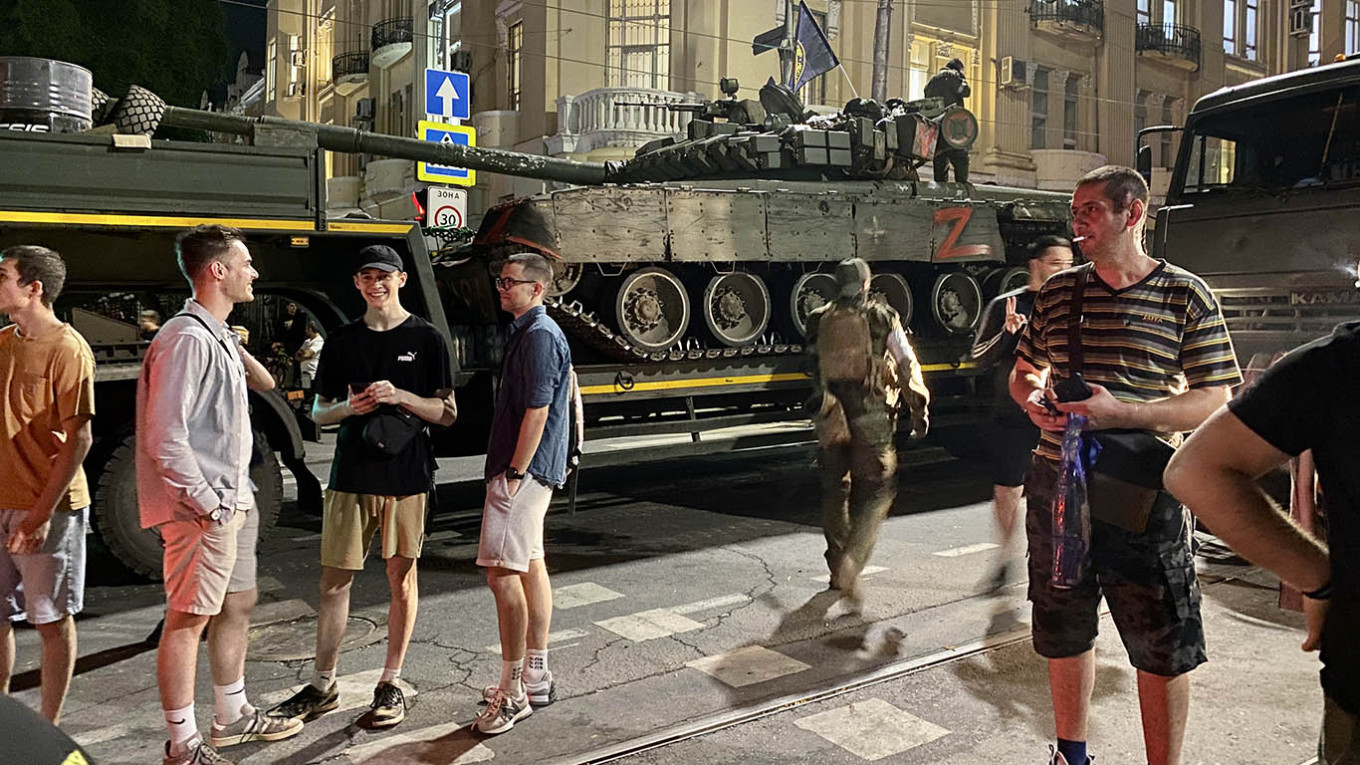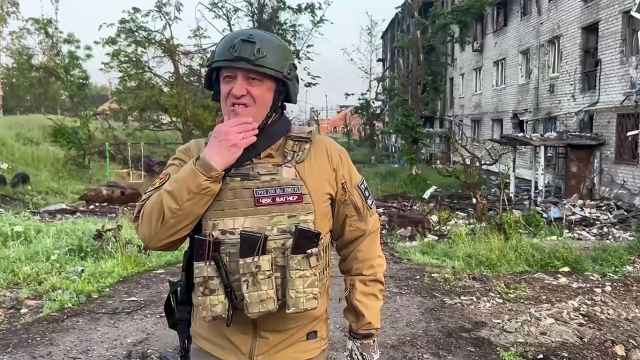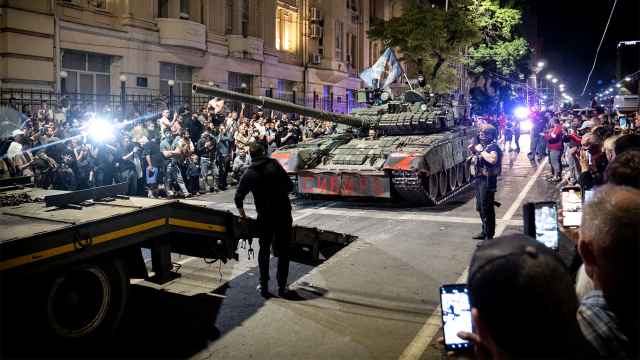A former employee of Yevgeny Prigozhin’s “troll factory,” a graduate student who found himself near the fighting and a soldier from Rostov-on-Don, the city occupied by the rebels.
Two years after Wagner’s stunning rebellion against the Russian military leadership, eyewitnesses recalled their memories of one of the most chaotic days in Russia's recent history in comments to The Moscow Times.
‘I was impressed — but not for long’
Polina, 22, was working for RIA FAN, the St. Petersburg-based news agency widely known as the “troll factory” for its role as one of the main propaganda arms of Yevgeny Prigozhin’s media empire.
Late in the evening of June 23, 2023, she was jolted awake by a phone call.
“My phone was blowing up with messages,” said Polina, who, like others interviewed for this article, withheld her surname for safety reasons. “My bosses were asking everyone who was able to come to work urgently. The people who were in the office on the night shift couldn't keep up with the flood of news and urgent tasks from Prigozhin's press service.”
When Polina read that her boss had suddenly declared a “march of justice” and sent a column of Wagner mercenaries toward Moscow, she was stunned.
In profanity-laced tirades, Prigozhin accused Russia’s top military brass of “stealing” Wagner’s victories in Ukraine and slammed the Kremlin’s “monstrous bureaucracy” for hampering the war effort.
“I only had curse words running through my head,” Polina recalled. “But at the same time, I felt a strange kind of respect for the man who started this rebellion. Here was Putin’s former chef, someone who had served him personally, now taking up arms against his tsar and sponsor. It felt like something new. I was pleasantly impressed… but not for long.”
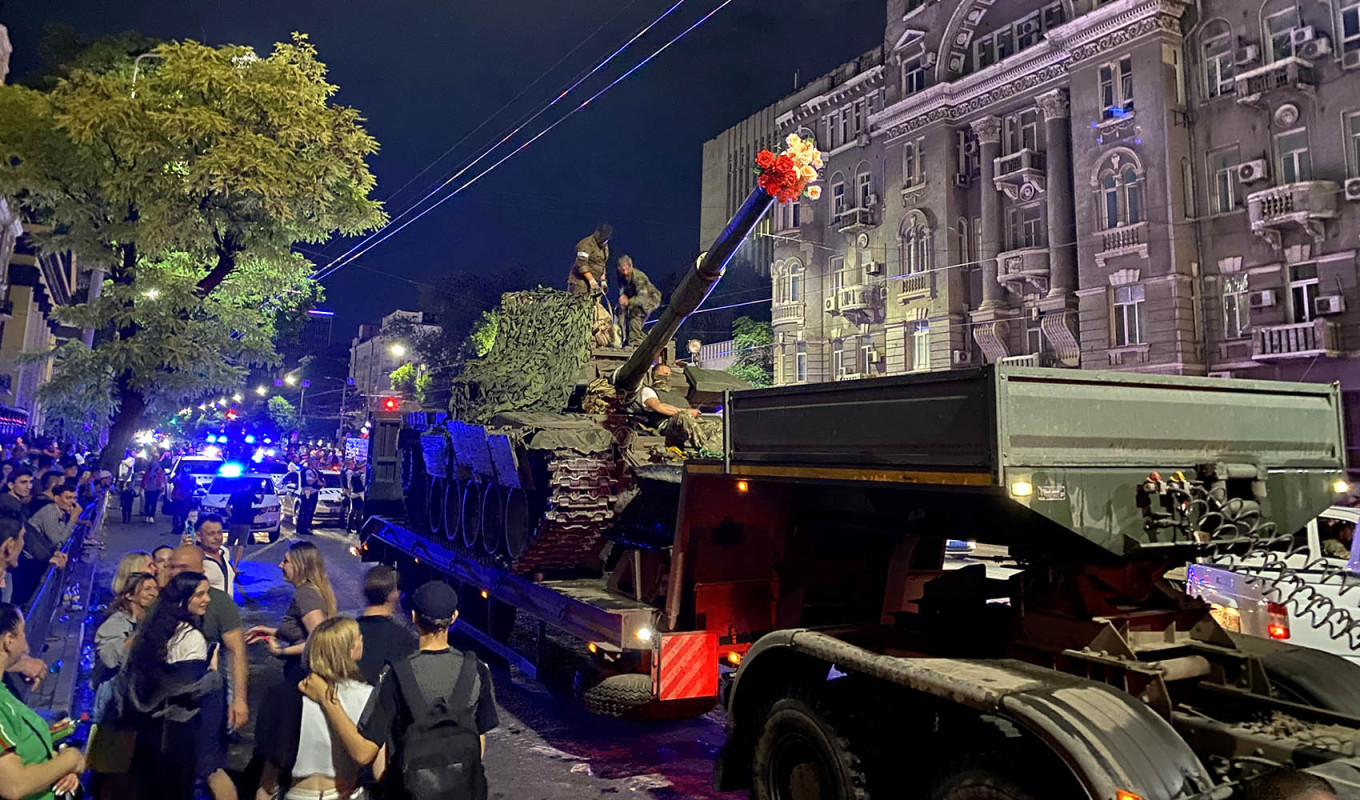
She worked from home through the night, barely able to process what was unfolding. Meanwhile, Wagner’s forces met no resistance as they rolled into Rostov-on-Don, a city of 1 million people, and seized the headquarters of the Southern Military District along with several government buildings.
“All I could do was publish the press releases Prigozhin’s team was sending us,” she said. “Soon after, the authorities blocked our website. Everything started glitching. I didn’t even have time to catch my breath — I just passed out at four in the morning.”
While Polina was scrambling to write the news, Dmitry, a military officer, took up his post in Rostov-on-Don.
“I showed up for duty and saw a crowd of people sitting in front of the TV, watching a report that there was a rebellion and Prigozhin was heading toward Rostov,” he said. “Then they showed an appeal from General Surovikin calling on the mercenaries to stop. We started joking that next they’d show ‘Swan Lake’,” he added, a reference to the ballet famously broadcast during the Soviet coup attempt of 1991.
Dmitry said that opinions among his comrades were mixed.
“Some respected Prigozhin for speaking openly about the problems in the Defense Ministry. Others saw him as a conman leading an army of criminals,” Dmitry said.
If the mutiny had succeeded, some soldiers might have supported him, he acknowledged.
“But not me. I swore an oath to Russia, not to a private military company,” he said.
“I was terrified,” he recalled. “Not for myself, but more for my wife. I texted her to say I was fine and asked her not to read the news. Most of all, I didn’t want all of this to end in bloodshed.”
‘It would have been cinematic to die like that — but I took a taxi’
As Polina was falling asleep after working all night, Wagner fighters were clashing with Russian troops in Voronezh, another city of 1 million people in southern Russia.
Meanwhile, Georgy, a 25-year-old graduate student, was returning to his home in the Voronezh suburbs after a night at the bar.
“A friend suddenly called me and said there were reports of gunfire near the city,” Georgy said. “I checked Google Maps and saw that my bus was going right past that area.”
“It would have been cinematic to die right after someone told me, ‘Be careful, there’s shooting going on’,” he joked. “But I decided to take a taxi and go a different route. Luckily, I got home without incident and fell asleep at seven in the morning.”
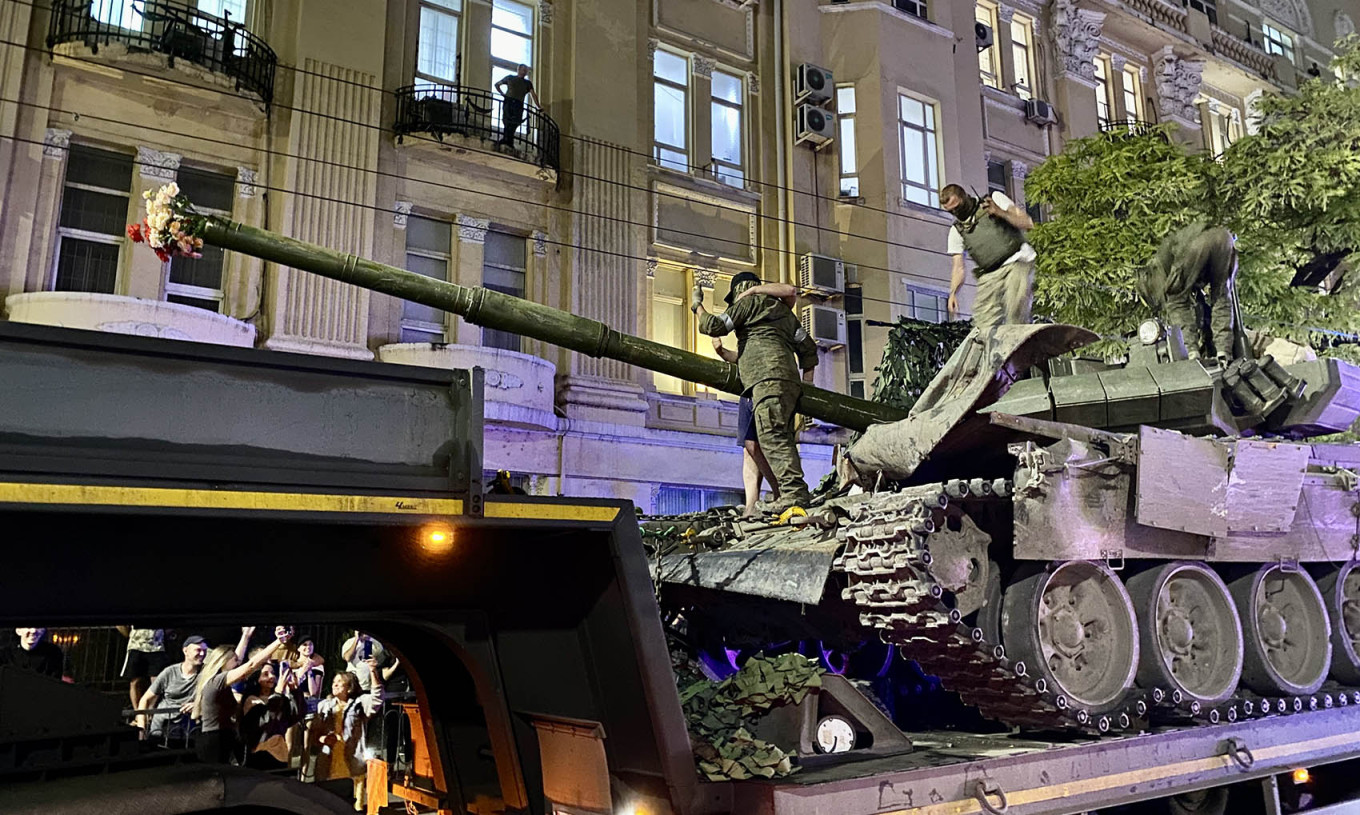
While Georgy slept, a military helicopter crashed just a few kilometers from his house, an oil depot exploded and a shell hit a nearby apartment block. Authorities declared a counterterrorism operation in the region.
“I called my boss and said I couldn’t come in to work that day. He treated it with understanding,” Georgy recalled, smiling.
‘My respect turned to outrage’
Polina was also unable to go to work that day, but for a different reason: Federal Security Service (FSB) agents were raiding the RIA FAN office.
“When I woke up, I saw a message in the work chat that they’d broken down the doors and started searching the place. My colleagues were detained. They stopped responding to messages,” she said.
As she saw reports of deaths and destruction from the rebellion, she said her initial admiration for Prigozhin gave way to outrage.
“Did his media employees deserve to be detained and interrogated? Did they deserve to risk criminal prosecution?” she asked. “I was in limbo, waiting for any of my colleagues to tell me what had happened and what would happen next.”
Polina said that FSB officers were looking for the personal details of everyone who worked for Prigozhin’s companies.
“They went through our computers. You could find everything we’d disclosed during polygraph tests when we were hired: our addresses, passport details, phone numbers, information about relatives, real estate abroad, protest records, opinions about Putin and the war,” Polina said. “A lot of compromising information.”
She remained frozen in fear until the evening of June 24, when Prigozhin abruptly announced he was turning his forces around. The Kremlin had agreed to spare the mutineers from prosecution for treason in exchange for Prigozhin going into exile in Belarus.
“My colleagues were released from the office. I felt relieved. I hoped everything would be fine, that we wouldn’t be prosecuted. But I had mixed feelings. It was over before it really began. I thought that all these sacrifices were not worth it. It all seemed like a circus to me, just a show. Prigozhin’s ego trip," said Polina, adding that her colleagues felt similarly.
‘No one knew what we were doing anymore’
After that, Prigozhin disappeared from public view.
Polina returned to work, even though she did not understand why she was still showing up at all.
“Since our website was blocked, we had to use VPNs in the days that followed. No one was reading our stories. Our website traffic was practically zero. Our media were dying. And there was no word from our boss Prigozhin.”
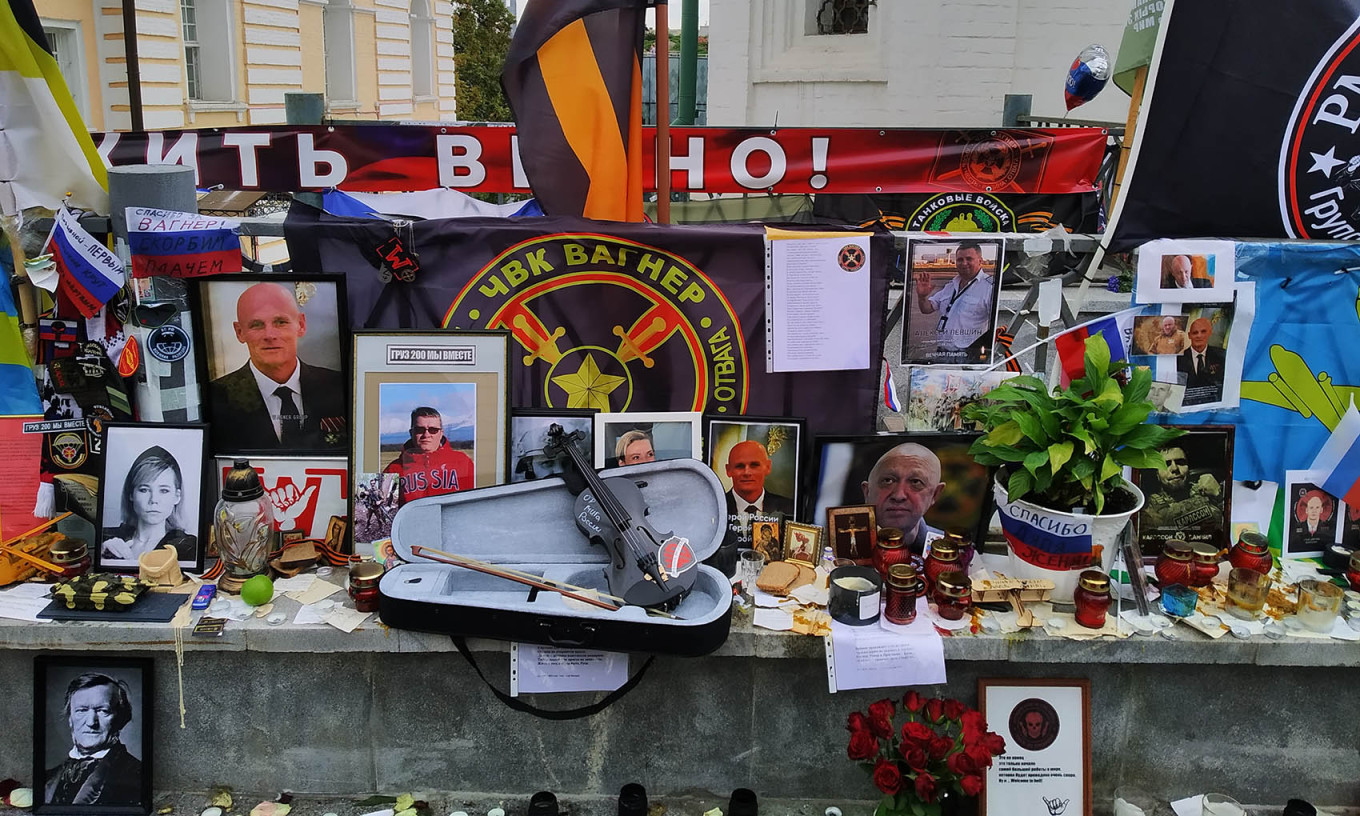
Nor did RIA FAN’s editor-in-chief give any clear guidance.
“He said, ‘Let’s keep working for now and figure it out later,’” she recalled.
Soon, exiled Russian media started reporting that Prigozhin’s media holding company was about to shut down.
“In every article, they called us ‘Prigozhin’s trolls’,” Polina said. “Many of my colleagues made fun of that — ‘Liberals are shouting about a troll factory, but they don’t dare to call us journalists.’ Yet all of those Meduzas and DOXAs are propagandists just like us.”
Still, she admits, most of the staff were not particularly patriotic and did not care much about Prigozhin’s fate.
“We never really talked about politics during breaks or lunch in the cafeteria. I think most people were working there for the money and the comfort. Everyone was mainly worried about their salaries,” she said.
Later, she learned that RIA FAN’s top editors had known in advance that their office would be searched.
“They quietly deleted their personal info from shared files before the security forces arrived. They didn’t warn anyone, nor did they even recommend working from home that day. They just left,” she said.
A week later, all RIA FAN editorial staff were asked to submit letters of resignation.
Polina says she hasn’t kept in touch with her former colleagues.
“After they left me without a salary, I didn’t want to think about Prigozhin or his companies ever again,” she said. “All I know is some guys found work at other outlets not affiliated with Prigozhin’s holding company. Apparently, there was a lot of demand for former ‘trolls’.”
‘A turning point that never happened’
Two years after his rebellion and death in a mysterious plane crash, Prigozhin himself appears to have largely been forgotten by the public. On the anniversary of the mutiny, there were no reminders of those events on the streets of Russian cities.
Today, the late Wagner leader is mostly remembered through memes and the coarse, memorable phrases he coined, especially one from the day of the rebellion: “There are 25,000 of us, and we’re coming to sort things out!”
“Prigozhin did a lot for the front [in the war],” said Dmitry, the officer. “But no one really understands why he did what he did that day. It’s a shame about the guys who died.”
“His rebellion will go down in our country’s history as a turning point that never happened,” he said.
A Message from The Moscow Times:
Dear readers,
We are facing unprecedented challenges. Russia's Prosecutor General's Office has designated The Moscow Times as an "undesirable" organization, criminalizing our work and putting our staff at risk of prosecution. This follows our earlier unjust labeling as a "foreign agent."
These actions are direct attempts to silence independent journalism in Russia. The authorities claim our work "discredits the decisions of the Russian leadership." We see things differently: we strive to provide accurate, unbiased reporting on Russia.
We, the journalists of The Moscow Times, refuse to be silenced. But to continue our work, we need your help.
Your support, no matter how small, makes a world of difference. If you can, please support us monthly starting from just $2. It's quick to set up, and every contribution makes a significant impact.
By supporting The Moscow Times, you're defending open, independent journalism in the face of repression. Thank you for standing with us.
Remind me later.



